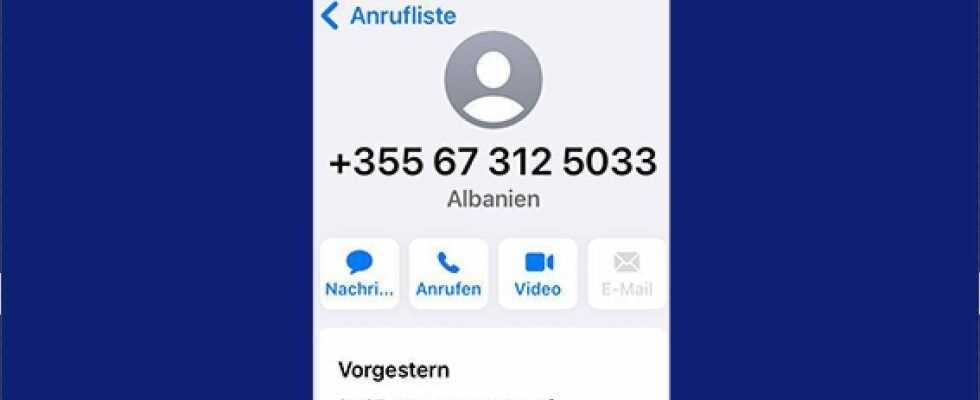Published
Calls from various countries have flooded the smartphones of Swiss people in the last few days. An expert and the police warn that Swisscom has already reacted.
In the past few days, unpleasant calls on Swiss smartphones have increased.
The numbers supposedly came from countries like Albania.
Most of the time they are fraudsters, warn the police and an expert.
Swisscom recognized the problem and blocked various numbers.
Various readers reported in the last few days at 20 minutes and warned of suspicious calls. They report receiving several missed calls from Albania early in the morning after getting up. The spam calls are discussed lively on Twitter. Corresponding calls are reported not only from Albania, but also from countries such as Zimbabwe and Lithuania.
The Zurich canton police are aware of the spam calls, as Marc Besson from the media service confirms. He warns: “The number displayed does not match the sender. The perpetrators use appropriate techniques for this. ” It is true that there does not have to be a fraud behind every call from abroad. Nevertheless, the Kapo recommends not to call back. “The numbers could be chargeable.”
“A callback can cost over 20 francs”
The scam is not new, as IT security expert Thomas Dübendorfer says: “The last time there were more calls like this, 20 or more francs were charged directly when you called back. That may be a relatively small amount for the individual, but it can still be worthwhile for the fraudsters if enough people call back. “
That is why Dübendorfer also says that one should not call the numbers back under any circumstances. Suspicious numbers can also be reported to the National Cybersecurity Center (NCSC). “The police can also be involved,” says Dübendorfer. The chance that she will take action is relatively small: “In order to take action against fraudsters abroad, you have to submit a request for legal assistance. For this to be worthwhile, a larger amount of offense must first have been accumulated. “
Swisscom has already responded
The NSCS has not received any reports of calls from foreign calls in the last few days – but increasingly via fraudulent emails with alleged subscriptions to Amazon, Netflix and Co. (see below). The fact that the calls were not reported could also have something to do with the fact that the telecommunications providers apparently acted quickly. At Swisscom, for example, the call filter was activated relatively quickly.
“In fact, in the last two days, on December 26th and especially on December 27th, our call filter blocked the two Albanian numbers in 99 percent of the cases,” says Swisscom spokeswoman Sabrina Hubacher. The calls mentioned (see screenshots) probably got through before the call filter could intervene. A number from Zimbabwe was also recognized as spam and blocked. “In total, the call filter blocks around 200,000 calls a day,” says Hubacher. The tool can be activated online for free.
If calls from unknown foreign numbers get through anyway, Swisscom advises you to be careful and not to call back. Numbers or number blocks that should also be blocked can be blocked individually. If you are unsure, you can contact customer service.
The National Center for Cybersecurity has received slightly more reports in the last few days regarding allegedly double-paid invoices from Swisscom. The name Amazon was also used increasingly to announce a package and thus lure customers to a phishing site. Ultimately, the fraudsters try to get credit card details. The NCSC advises never to enter personal data such as passwords or credit card details on a website that has been clicked on via a link in an email or SMS and to report phishing emails to antiphishing.ch.
As a member, you become part of the 20-minute community and benefit from great benefits and exclusive competitions every day!


